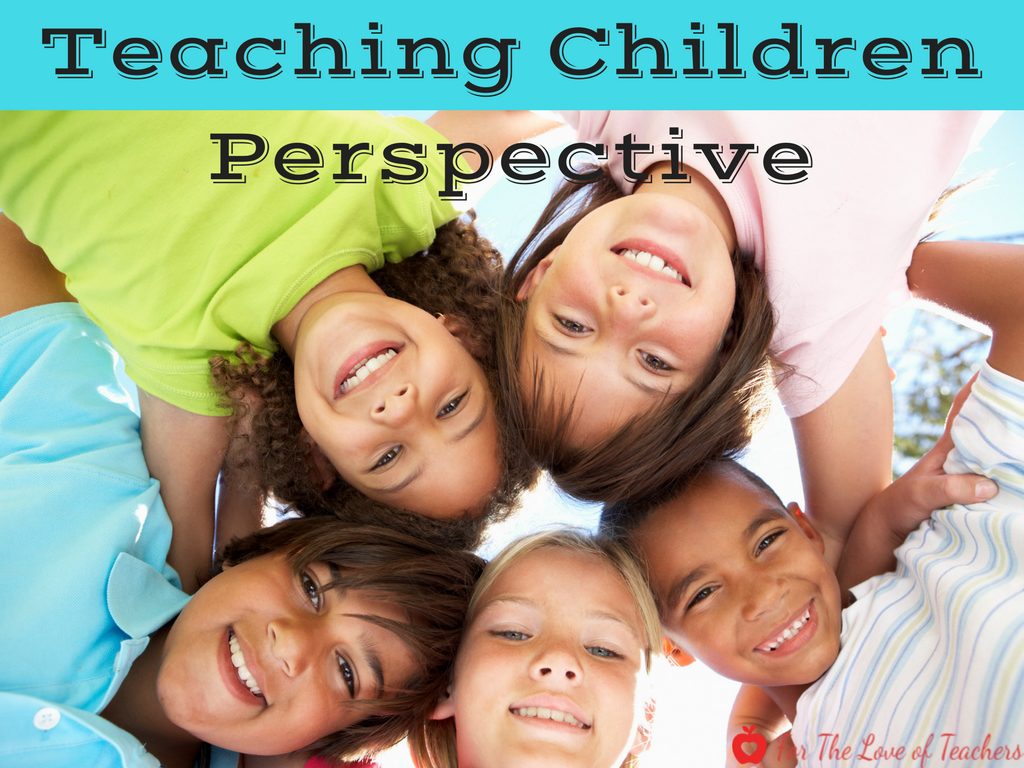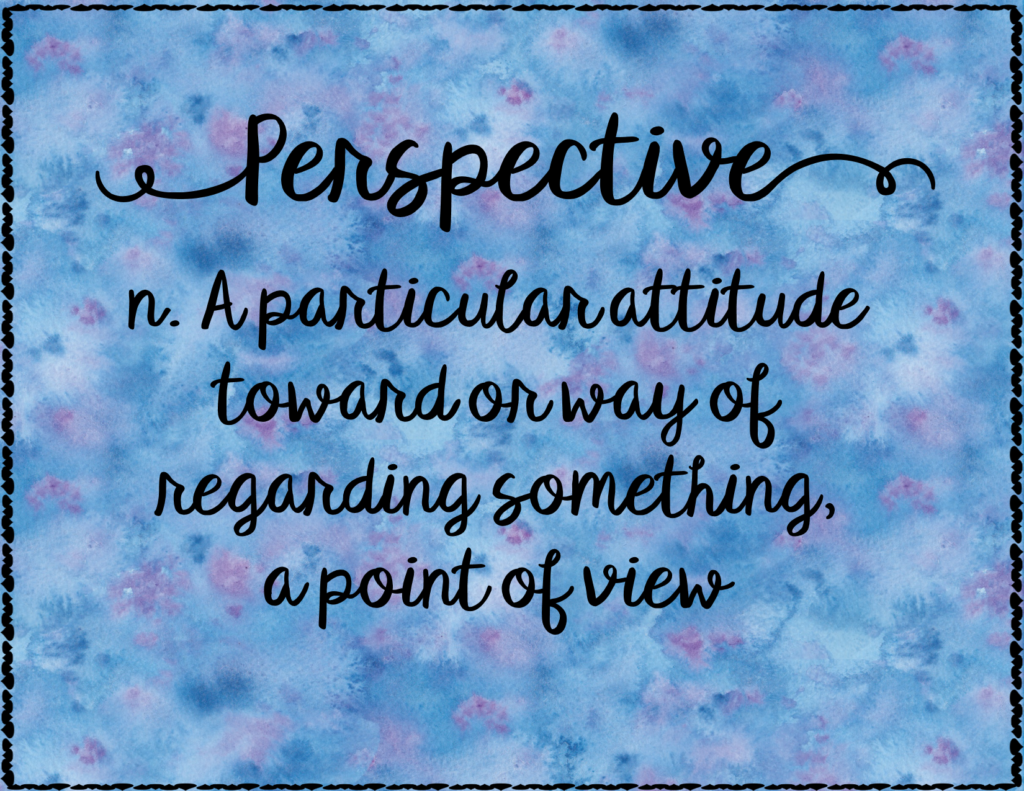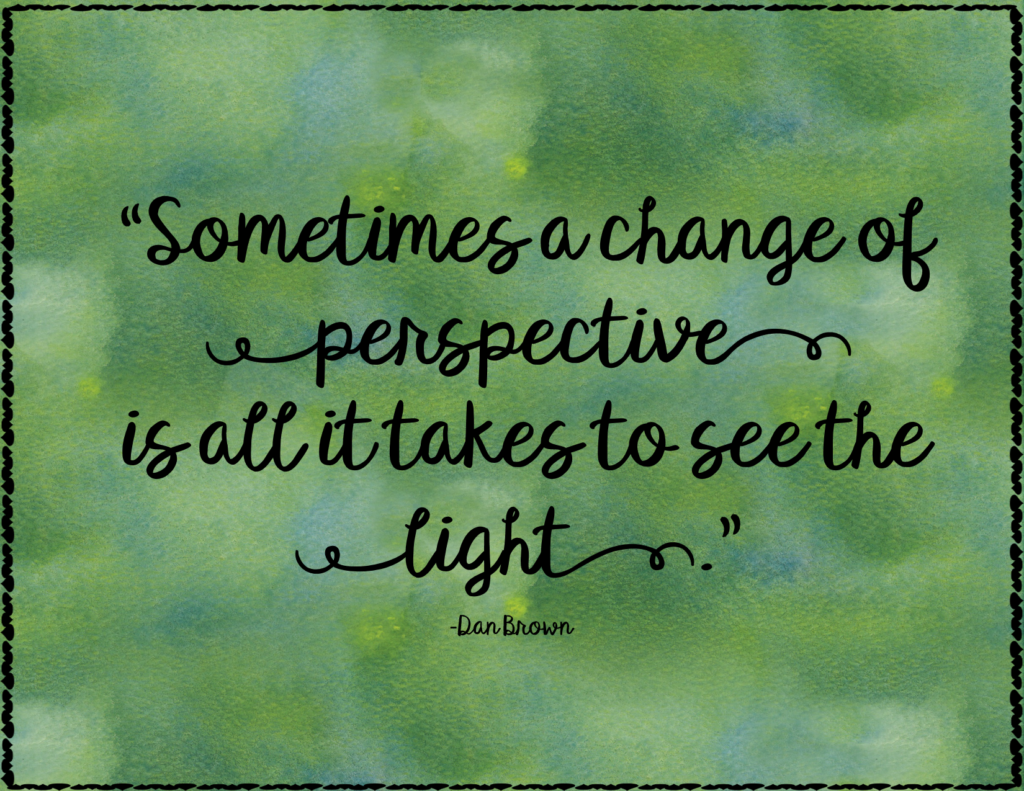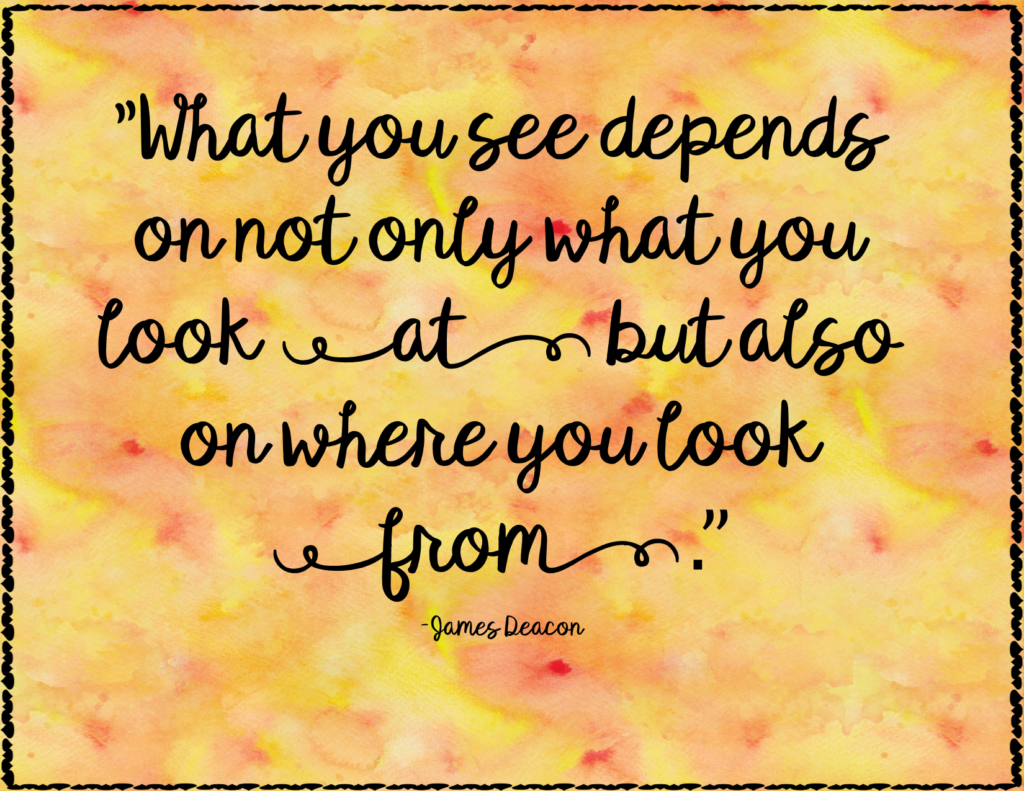
Children of all ages are still developing in forming and understanding their own perspectives, as well as understanding the perspectives of others. It entails many skills, emotionally, socially and developmentally. It requires children to see the bigger picture of things. As I think back to when I was a child, I was socially aware of my own perspectives in various situations, as well as the perspectives of others. I picked up social cues early on and was aware of how others were feeling by reading facial expressions and other non-verbal gestures. I worked through social issues that had developed between my circle of friends before they escalated into bigger problems. But this certainly is not the case for all children. As a parent and educator, I see many children struggle with perspective taking, and many times misinterpret what’s really going on.

Teaching Perspective
I, like most teachers, teach perspective through mentor texts. Putting ourselves in the character’s shoes, trying to understand, relate or connect with what the character is thinking, feeling or experiencing. This is an effective way to teach perspective to students. Students learn how to understand different perspectives within different situations, whether they are familiar with it or have experienced it or not. Teaching perspective offered many opportunities for engagement in discussions, critical thinking, making connections and character analysis. I remember as a kid learning through characters, feeling, thinking and experiencing through their eyes and in their shoes. I learned a lot of valuable lessons through terrific books and interesting characters.
Need books? Check out this list, Books that Teach Perspective. For more books about teaching perspective grades 3-5, click here.
I also see children struggle socially with perspective taking. I spent many recess periods helping children problem solve together. One child’s perspective of the same situation could be extremely different from another child’s. For example, one child has the perspective that their friend no longer wants to be friends because they chose to play with another friend at recess. Or a child feels upset when a friend tagged them a bit hard in Phys. Ed perceiving that the child “hit” them instead of tagged them out in a friendly game. Now we can’t always assume that one’s perspective is wrong, but helping children work through their perspectives by talking about it, listening to all sides and coaching students in problem solving helps put things into “perspective.” Misinterpreting what’s really going on affects present and future friendships and relationships.
Recently I received one of Danny Brassell’s emails titled, Do You Have Proper Perspective? Mr. Brassell is an inspirational, educational, and motivational speaker. This email about having “proper” perspective resonated with me. He stated, “Nowadays, whenever I catch myself griping about my problems, I remind myself that I have “first-world problems.” I have food, shelter and clothing. I have a wonderful family. I live in a country where people are free to criticize their government without facing imprisonment. When I speak to audiences I try to remind them to maintain a proper perspective. As bad as yesterday may have been, that does not have to affect your “today.” I thought that having this perspective is really important to teach children and to remind ourselves as well. Thinking about real life with perspective in mind keeps us balanced. I try to remind myself and others of this perspective while sitting in traffic, or waiting in the long line at Dunkin Donuts, or frantically searching for a parking spot when running late. Changing one’s perspective with, “Hey, I got it pretty good” helps. Be thankful, be patient and be grateful. We can’t always sweat the small stuff. Having this kind or perspective along with positivity is contagious to children. So teach it, model it, preach it, and practice it. You’ll see that having “proper” perspective makes everyday a bit easier in and out of the classroom.
If you like my perspective quote posters, you could get them here. They are perfect for the classroom, bulletin board display, home, or even the office!
What’s your perspective? How do you teach perspective to children?
Have any ideas to share? Be sure to visit the Forums to share ideas and products. There are many ideas and products posted there so be sure to check them out.
Be sure to visit For The Love of Teachers Shop for classroom resources and join For The Love of Teachers email list to receive the latest and greatest updates, plus receive my latest freebies.
And remember to keep it in perspective!
If you like it, then pin it!



Christine Weis is a passionate educator, classroom management coach, wife, and mom of two busy boys. She enjoys teaching, writing, and creating resources for teachers.







This is all so true. I use books to help teach perspective to my 5 year old, and she starting really paying attention to the perspective of things when she started Kindergarten this year. Great post!
Oh that’s fantastic! Way to go Mom!! Understanding perspective is a life skill and I’m glad you started teaching your daughter early on! Thanks for reading!
Christine at For The Love of Teachers
I think it is so important to kids to learn social skills including understanding other peoples emotions and opinions early on. It is such an integral skill to daily interactions but it seems to be so overlooked.
Teaching social skills/life skills is so important. We teachers always say there just isn’t enough time in the school day to teach what we have to teach, but we have to make the time to teach these things too. Thanks for reading!
Christine at For The Love of Teachers
I love the idea of teaching children perspective through reading books and putting yourself into the characters shoes! That certainly helped me gain perspective as I was growing up.
I agree! It helped me too! I love hearing or reading about other people’s experiences and stories. I learn so much! Thanks for reading!
Christine at For The Love of Teachers
As a former preschool teacher and director. Books are a great way to teach perspective to children.
Yes…I most certainly agree. Books can teach anything! 🙂 Thanks for reading!
Christine at For The Love of Teachers
I know a lot of adults that need to learn some perspective. I guess this really makes sense, a lot of the people I know who are understanding and better communicators were, or are, readers.
Yes…for sure! Adults too have a difficult time with perspective. I think reading and posting quotes on a daily basis whether it be at home or in the office is helpful to keeping things into perspective. Thanks for reading!
Christine at For The Love of Teachers
This is so important. Thanks for sharing! xo, Suzanne
I agree! Thank you Suzanne!
Christine at For The Love of Teachers
You sound like such a caring and patient teacher…. What a blessing you are!! My youngest son has trouble understanding social cues etc and teachers like you make such a wonderful difference ….
What a thoughtful thing to say! You made my heart smile today so thank you for your comment and thank you so much for reading. Many children struggle understanding social cues.I know there are good teachers out there that are supporting your son with this in school.
Christine at For The Love of Teachers
I think this is the most important and difficult. teaching perspective is quite a task but one can be taught only through understanding their issues.
True! Perspective is really difficult to teach. It’s all about empathy and understanding what other’s experience, even if you haven’t experienced it yourself. Thanks for reading!
Christine at For The Love of Teachers
You sound like a wonderful teacher a mom that is not only a great educator, but very patient and kind when teaching your children and students!
Thank you Nina! This is such a sweet comment! I am very passionate about teaching and education. I’m glad it shows through in my posts!
Thank you for your thoughtful comment and for reading! It means a lot!
Christine at For The Love of Teachers
I’m not a parent yet but I find all of this information incredibly relevant and useful to people of all ages. I appreciate you sharing with us!
Thanks Stephen! I agree…teaching perspective is definitely relevant to all, including adults. Thanks for reading!
Christine at For The Love of Teachers
Interesting food for thought. I agree about books, as a child growing up my mom (an English teacher) always kept books around and we read every genre which definitely shaped my perspective. I also think diverse classrooms and interactions with kids not like them whether in the classroom, through travel, etc also shapes a young person’s perspective.
Good point…diverse classrooms and interactions with kids definitely shape perspectives. Thank you for reading and for your thoughtful comment!
Christine at For The Love of Teachers
I’ve worked with girls, ages 5-14, and the way I seen them grasp the concept of perspective is making the problems of characters they’re familiar with relative to their problems. It really resonates with them and allows them to view the issue at hand on a basic level. -Fox
Yes…making connections to others, including characters, helps students grasp the concept of perspective. I love finding books with diverse characters and plot for this reason. Thanks for sharing and for reading!
Christine at For The Love of Teachers